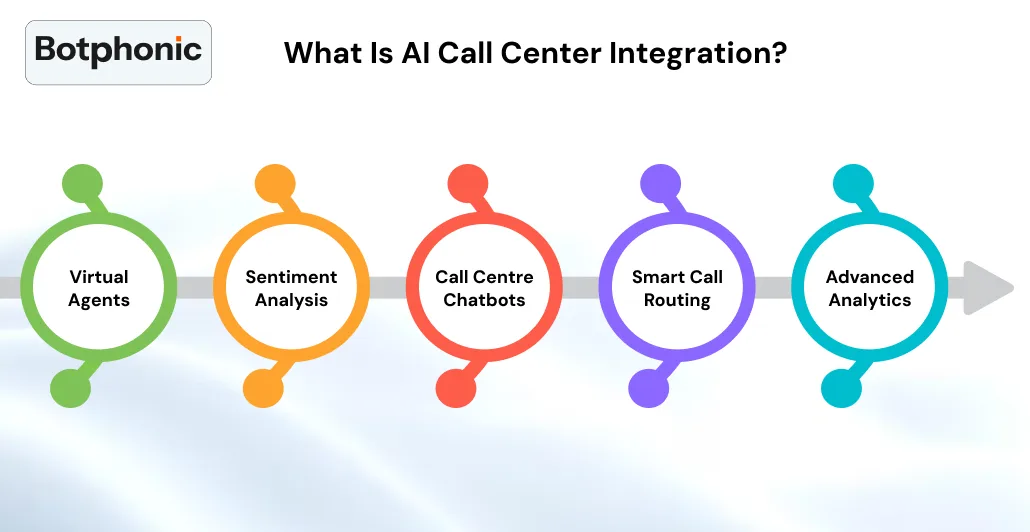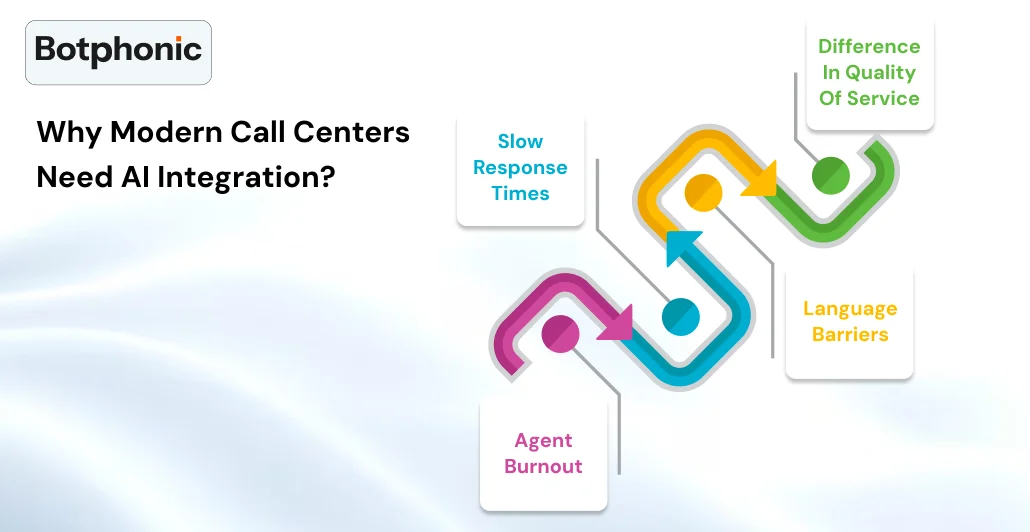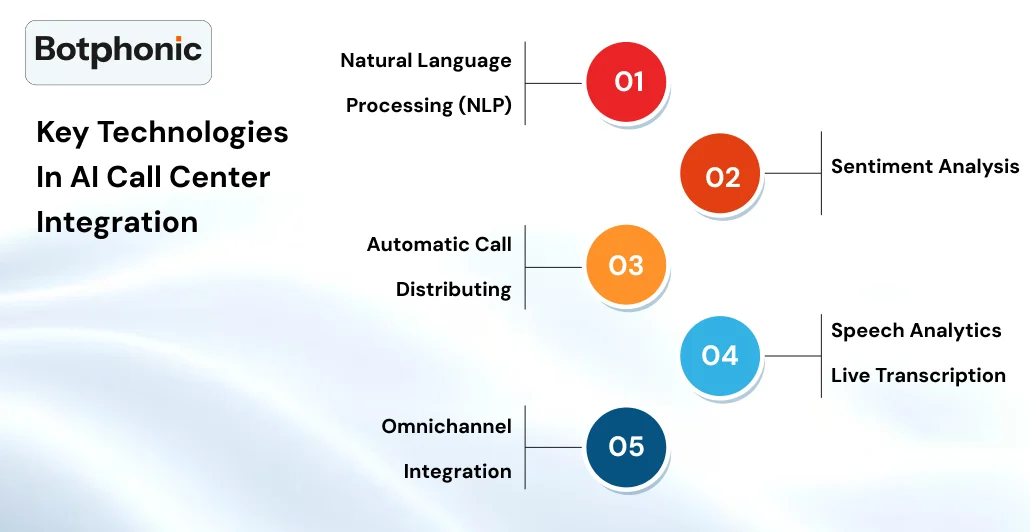
Summarize Content With:
Summary
In this blog, we will explore how customer service is changing through the integration of AI call center solutions, what the major underlying technologies are, and how you can use AI call centers, as well as the best practices in implementation, and answer your burning questions.
Introduction
Consider a call centre where each customer receives an instant, human, perfectly timely and appropriate response anytime, anywhere, in any language, with no wait time.
This is the potential of the integration of AI call centres, a technology that combines the process of natural-like conversation with the dynamism and accuracy of artificial intelligence.
It does not replace your team; it operates with them only, taking on the routine tasks and ensuring that customers never feel unattended. The Botphonic platform enables this using scalable, secure, and natural-sounding AI voice agents, allowing businesses to provide outstanding customer service via voice, chat, and other media, with no stress, wait time, or inconsistency of traditional call centers.
Key Takeaways
- Integrating AI in call centers is transforming customer support in business, as it increases efficiency, reduces costs, and enhances personalisation.
- With the effective integration of an AI call center, human-like conversations, sentiment analysis, omnichannel support, and actionable insights are combined.
- Botphonic is a highly scalable plug-and-play solution for integrating an AI call centre into an existing call centre, including voice agents, real-time transcription, templates, and powerful integrations.
- The integration of the call centre and AI should be based on the pilot-first solution, agent cooperation, safety, the presence of clear KPIs, and the process of continuous expansion.
What is AI Call Center Integration?

The combination of artificial intelligence tools, apps, and analytics into your call center ecosystem is what we call AI call center integration. Having a chatbox on the page is not enough; instead, it’s about creating a single AI that can work alongside your human agents and exchange information, directing tasks and providing immediate answers.
The most important items about the integration of the AI call center are:
- Virtual Agents: An AI-based helpful hand that is capable of taking calls and making them, receiving and passing on known questions, as well as carrying out a particular procedure, such as booking an appointment or querying a product order.
- Sentiment Analysis: Voice tone, speed, and word selection are examined by AI systems, and based on this analysis, the message about the emotional attitude to customers can be adjusted accordingly.
- Call Centre Chatbots: They are text-based agents involved in the live chat setting, responding to simple questions in real-time.
- Smart Call Routing: The AI won’t send people to any random or available agent, but to the agent best suited to address the problem.
- Advanced Analytics: AI analyses and processes data taken in every contact and provides managers with detailed information about the performance and the possibility to optimise it.
Such integration turns the old-fashioned AI call center into a flexible, responsive, and client-focused entity. It facilitates details such as multilingual support, customised responses, and the capacity to deal with thousands of current interactions at a time without procrastination.
Why Modern Call Centers Need AI Integration?

Contact center demands have hugely increased over the past years. Customers want to be treated in a more personal manner, receive more rapid responses, and be available 24 hours a day. Meanwhile, companies have to achieve cost control when faced with high employee turnover and call volume changes.
Concerns that traditional call centres have to deal with are:
- Agent Burnout: Monotonous work and frequent calls cause boredom, leading to mistakes and turnover.
- Slow response times: Human agents cannot attend to more than a single call at a time, and hence, a situation leading to bottlenecks during the peak hours can be witnessed.
- Language Barriers: The customers might have a different language or accent, which makes it hard for the agents to understand the customer.
- Difference in quality of service: The quality of service would be different because different agents might have varying levels of training and knowledge.
AI in contact centres is combating these issues by automating regular interaction, providing timely response solutions, and having the capacity to customise according to surges in demand. AI is especially useful in BPO (Business Process Outsourcing) companies, as it enables them to work efficiently with clients of various industries and/or languages, providing services of the same level of quality.
Industry Stat: According to Gartner, 80% of customer service and support organizations are predicted to use generative AI to improve customer experience and agent productivity by the end of 2025.
Discover how Botphonic’s AI call center integration can help you deliver faster, more human-like, and multilingual support around the clock.
Start your free demo todayKey Technologies in AI Call Center Integration

The integration of a call center using AI is successful, depending on the strong technologies involved. These technologies combine to provide human-like connections, help to gain profound information, and facilitate work processes.
1. Natural Language Processing (NLP)
Use of NLP enables an AI to interpret, understand, and naturally process human language. The technology also fuels call center voice AI and text-chat bots that can interact with complicated questions.
2. Sentiment Analysis
AI can identify whether a caller is frustrated, satisfied or neutral, judging by the tone, volume, and the words being used. This makes artificial intelligence call centre systems respond in a more empathetic fashion.
3. Automatic Call Distributing
There is smart routing of calls, depending on the query’s type, the customer’s history, and the availability of the corresponding agent or AI module.
4. Speech Analytics Live Transcription
Real-time transcription of voice conversations allows easy content analysis, compliance tracking and the ability to glean actionable data.
5. Omnichannel Integration
With AI contact centre technology, it is possible to keep all conversations connected across voice, email, chat, and social media.
Top Use Cases and Case Studies
| Use Case | Description |
| Inbound Support | AI handles FAQs, troubleshoots issues, and intelligently routes calls based on customer queries. |
| Outbound Calls | AI manages outbound campaigns, including reminders, surveys, and follow-ups with customers. |
| Sales & Telemarketing | AI identifies high-potential leads and automates telemarketing outreach to increase sales. |
| Healthcare Scheduling | AI books appointments, sends reminders, and handles cancellations without human intervention. |
| Banking & Finance | AI helps customers check balances, handle transfers, and flag fraud alerts efficiently. |
| Customer Retention | AI follows up with dissatisfied customers, offering personalized solutions to improve retention. |
| Omnichannel Support | AI integrates with multiple channels like voice, chat, email, and social media for seamless service. |
| AI Call Center Analytics | Real-time data analytics and insights into agent performance, customer satisfaction, and contact center efficiency. |
| Customer Surveys | AI conducts surveys post-interaction to gather feedback, automatically processing responses for insights. |
| Order Management | AI assists with order tracking, status updates, and returns, providing a seamless customer experience. |
Top Must-Have Features for AI Call Center Integration
When thinking about such a solution as Botphonic, one should make sure that it is characterised by:
- Humans like conversational voice agents.
- Quality speech and conversation analysis.
- Real multilingual options to reach out across the planet.
- Omnichannel connectivity to deliver uniform service.
- Reporting and dashboarding in real-time.
- Embedded compliance and security.
- Google-friendly templates that can be implemented in a short period.
- Smooth CRM, calendar and app integrations.
How to Implement Successful AI Call Center Integration?
- Evaluate Needs Comprehensively: First identify processes that delay or generate dissatisfaction. For example, AI appointment scheduling tools might simplify booking processes and cut waiting times.
- Pilot to a Start: Begin with the deployment of AI on one or two tasks to assess the performance and adoption.
- Educate Your Staff: Have the staff work-in-training operate with AI, clarifying that it is not a substitute.
- Ensure Security and Compliance: Check encryption and data privacy security.
- Measure and Optimise: Monitor KPIs including CSAT, first-contact resolution, and cost savings.
Conclusion
The concept of AI call centre integration is no longer an added-value feature but a necessary functionality that any business that strives to live well in modernity and at the same time run its operations efficiently needs.
With Botphonic, a voice technology company equips the tool and integration that has been GPT-3 AI-powered to shift service delivery from reactive to proactive- this can be through AI Appointment Scheduling, AI Call Assistant, or any other intelligent automation solution.

